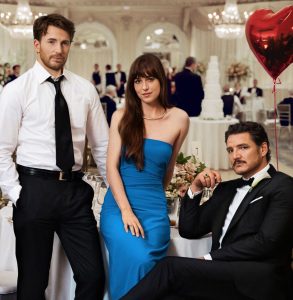Reviewed by Jeffrey Sanzel
Writer-director Celine Song’s feature debut, Past Lives (2024), was an exquisite and near-perfect exploration of the time and space that exist between people, even when they are inches apart. Spanning just over two decades, the film lived in its visceral silences and often awkward but wholly recognizable exchanges. It builds to a painful but tacit triangle, simultaneously satisfying and melancholy.
Song crafted the film around issues of Korean versus Korean American (or Canadian) culture, discovering what is kept and what must be left behind. Past Lives garnered universal accolades and received over forty well-deserved awards. It received Academy Award nominations for Best Picture and Best Original Screenplay.

In her sophomore offering, Materialists, Song tells the story of Lucy (Dakota Johnson), a former actor who now works for Adore, a New York City-based matchmaking service. At the outset, the plot appears simple, with Lucy deciding between her ex, the actor John (Chris Evans), and the wealthy financier, Harry (Pedro Pascal), whom she meets at the wedding of her ninth fruitful match. Harry, the brother of the groom, begins actively courting Lucy, taking her on expensive, high-end dates. Meanwhile, the chance encounter with John, who is a cater-waiter at the wedding, causes Lucy to reflect on her current choices.
The matchmaker-who-can’t-find-love is an old and well-worn trope seen in innumerable rom-coms and television shows. Along with Christmas movies, the clichéd setup ranks high as a Hallmark staple. The idea is generic, much like a painting of a bowl of fruit. But therein lies the difference. A million miles exist between a freshman art student’s first-time rendering and Picasso’s vision—whether realistic or cubist. And the same could be said of Song’s Materialists, a riveting delve into not just marriage but skewed expectations of a modern world.
The story remains basic, but the storytelling is rich, layered, and unflinching. The eloquent Lucy easily sells her work as a blend of fantasy and business. The several sequences in which she negotiates with clients reveal her insight, yet her personal absence from the feelings she keeps suppressed. She promotes the idea that these desperate people seek “a nursing home partner and a grave buddy”—that they want partners for the long run. Whether she believes this or not is a matter that comes in and out of focus. For her and agency, a “successful” marriage reduces to a deal. For herself, she admits that her priority is for a rich man. The fact that she states this almost tongue-in-cheek is even more powerful. (The source of this drive is shown in an ugly breakup scene with John on their fifth anniversary.)
The film is basically three-handed. It follows Lucy’s new romance with Harry and her conflicted feelings for John. What they offer is clearly contrasted with Harry’s twelve-million-dollar penthouse and John’s appalling eight-hundred and fifty-dollar rent-controlled apartment, shared with two roommates, one of whom would put a pig to shame. But the differences are not nearly as simple as that.
While Lucy struggles with her personal path, her client, Sophie, in whom she has invested many hours and setups, is assaulted on a first date. The horrific incident forces Lucy to confront her motivations, complicity, and responsibility.

Song has constructed a highly literate script, witty and insightful, but allowing the characters to each speak in their own voices. She evokes exceptionally dimensional performances from her three leads.
Dakota Johnson is flawless in creating someone who is both formidable and fragile, self-deluding and self-aware. She presents herself as a woman who puts on a strong, active front, but is plagued by issues regarding the true meaning of value. She is the heart of the film and never misses a beat.
Chris Evans’ John is literally and figuratively a mess. Slightly rough around the edges, his John is earnest, genuine, and kind, but the manchild common to those chasing a dream that seems out of reach.
Pedro Pascal makes Harry more than just a foil for the central romance. He brings sweetness and a desire to make the best of his life, even if he is unaware of what he truly wants and needs. A late film revelation only serves to further his unspoken doubts.
Materialists is a more-than-worthy follow-up to Past Lives. Both films are shot in a desaturated world (almost as if light and joy are synonymous); they live in the painful pauses, unusual and erratic rhythms, and the ability to show truth with raw honesty and an occasional splash of humor. Materialists mines the situation, exposing the cynicism but eventually landing on a well-earned note of hope. While not a thriller, Song maintains a breathtaking and unflagging intensity. With Materialists, the filmmaker—the artist—this unique talent—has once again found a tale that will resonate with audiences long after the screen goes black.
Rated R, the film is now playing in local theaters.








